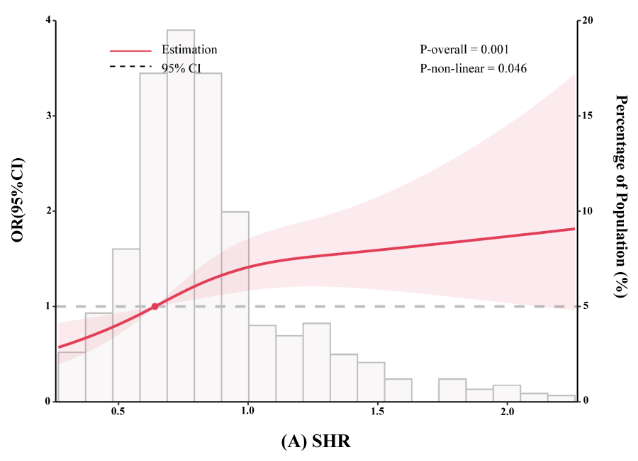Combined SHR and SIRI biomarkers predict increased coronary heart disease risk in type 2 diabetes
DOI:
https://doi.org/10.17305/bb.2025.13032Keywords:
Stress hyperglycaemic ratio, systemic inflammation response index, coronary heart disease, type 2 diabetes mellitus, risk assessmentAbstract
Coronary heart disease (CHD) is a leading cause of morbidity and mortality; patients with type 2 diabetes mellitus (T2DM) are at particularly high risk, highlighting the need for reliable biomarkers for early detection and risk stratification. We investigated whether combining the stress hyperglycemia ratio (SHR) and systemic inflammation response index (SIRI) improves CHD detection in T2DM. In this retrospective cohort of 943 T2DM patients undergoing coronary angiography, associations of SHR and SIRI with CHD were evaluated using multivariable logistic regression and restricted cubic splines; robustness was examined with subgroup and sensitivity analyses. Discriminative performance was assessed by receiver operating characteristic (ROC) analysis and reclassification metrics (integrated discrimination improvement [IDI], net reclassification improvement [NRI]). Internal validation used bootstrapping, with calibration and discrimination yielding apparent and bias-corrected estimates. Of 943 patients, 600 had CHD. Multivariable models showed SHR (OR=1.68; 95% CI, 1.14–2.46; p=0.008) and SIRI (OR=2.17; 95% CI, 1.54–3.05; p<0.001) were independently associated with CHD, with nonlinear relationships (p for nonlinearity <0.05). Findings were consistent across subgroups and sensitivity analyses. The combined SHR–SIRI model achieved an AUC of 0.813 (95% CI, 0.783–0.843), outperforming SHR alone (AUC=0.773; 95% CI, 0.740–0.805) and SIRI alone (AUC=0.745; 95% CI, 0.713–0.778), and significantly improved NRI and IDI (p <0.05). All models showed strong discrimination and calibration. In conclusion, SHR and SIRI are independently associated with CHD in T2DM, and their combination enhances early identification of high-risk individuals.
Citations
Downloads

Downloads
Additional Files
Published
Issue
Section
Categories
License
Copyright (c) 2025 Zixuan Guo, Siqi Song, Hao Cheng, Changxu Xie, Meng Zhang, Mengyang Pei, Mengting Liu, Zican Shen

This work is licensed under a Creative Commons Attribution 4.0 International License.









